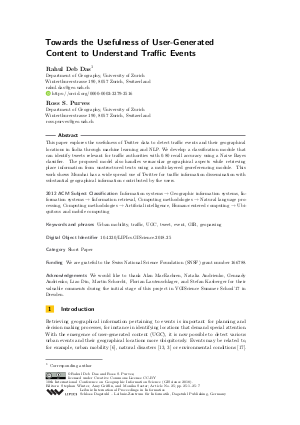Towards the Usefulness of User-Generated Content to Understand Traffic Events (Short Paper)
Authors
Rahul Deb Das  ,
Ross S. Purves
,
Ross S. Purves
-
Part of:
Volume:
10th International Conference on Geographic Information Science (GIScience 2018)
Part of: Series: Leibniz International Proceedings in Informatics (LIPIcs)
Part of: Conference: International Conference on Geographic Information Science (GIScience) - License:
 Creative Commons Attribution 3.0 Unported license
Creative Commons Attribution 3.0 Unported license
- Publication Date: 2018-08-02
File

PDF
LIPIcs.GISCIENCE.2018.25.pdf
- Filesize: 347 kB
- 7 pages
Document Identifiers
Subject Classification
ACM Subject Classification
- Information systems → Geographic information systems
- Information systems → Information retrieval
- Computing methodologies → Natural language processing
- Computing methodologies → Artificial intelligence
- Human-centered computing → Ubiquitous and mobile computing
Keywords
- Urban mobility
- traffic
- UGC
- tweet
- event
- GIR
- geoparsing
Metrics
- Access Statistics
-
Total Accesses (updated on a weekly basis)
0Document
0Metadata
Abstract
This paper explores the usefulness of Twitter data to detect traffic events and their geographical locations in India through machine learning and NLP. We develop a classification module that can identify tweets relevant for traffic authorities with 0.80 recall accuracy using a Naive Bayes classifier. The proposed model also handles vernacular geographical aspects while retrieving place information from unstructured texts using a multi-layered georeferencing module. This work shows Mumbai has a wide spread use of Twitter for traffic information dissemination with substantial geographical information contributed by the users.
Cite As Get BibTex
Rahul Deb Das and Ross S. Purves. Towards the Usefulness of User-Generated Content to Understand Traffic Events (Short Paper). In 10th International Conference on Geographic Information Science (GIScience 2018). Leibniz International Proceedings in Informatics (LIPIcs), Volume 114, pp. 25:1-25:7, Schloss Dagstuhl – Leibniz-Zentrum für Informatik (2018)
https://doi.org/10.4230/LIPIcs.GISCIENCE.2018.25
BibTex
@InProceedings{das_et_al:LIPIcs.GISCIENCE.2018.25,
author = {Das, Rahul Deb and Purves, Ross S.},
title = {{Towards the Usefulness of User-Generated Content to Understand Traffic Events}},
booktitle = {10th International Conference on Geographic Information Science (GIScience 2018)},
pages = {25:1--25:7},
series = {Leibniz International Proceedings in Informatics (LIPIcs)},
ISBN = {978-3-95977-083-5},
ISSN = {1868-8969},
year = {2018},
volume = {114},
editor = {Winter, Stephan and Griffin, Amy and Sester, Monika},
publisher = {Schloss Dagstuhl -- Leibniz-Zentrum f{\"u}r Informatik},
address = {Dagstuhl, Germany},
URL = {https://drops.dagstuhl.de/entities/document/10.4230/LIPIcs.GISCIENCE.2018.25},
URN = {urn:nbn:de:0030-drops-93539},
doi = {10.4230/LIPIcs.GISCIENCE.2018.25},
annote = {Keywords: Urban mobility, traffic, UGC, tweet, event, GIR, geoparsing}
}
Author Details
- Department of Geography, University of Zurich, Winterthurerstrasse 190, 8057 Zurich, Switzerland
Funding
We are grateful to the Swiss National Science Foundation (SNSF) grant number 166788.
References
-
E. D. Andrea, P. Ducange, B. Lazzerini, and F. Marcelloni. Real-time detection of traffic from twitter stream analysis. IEEE Transactions on Intelligent Transportation Systems, 16(4):2269-2283, 2015.

-
Farzindar Atefeh and Wael Khreich. A survey of techniques for event detection in twitter. Computational Intelligence, 31(1):132-164, 2015.

-
Andrew Crooks, Arie Croitoru, Anthony Stefanidis, and Jacek Radzikowski. #Earthquake: Twitter as a distributed sensor system. Transactions in GIS, 17(1):124-147, 2013.

-
Judith Gelernter and Shilpa Balaji. An algorithm for local geoparsing of microtext. GeoInformatica, 17(4):635-667, 2013.

-
Michael F. Goodchild. Citizens as sensors: the world of volunteered geography. GeoJournal, 69(4):211-221, 2007.

-
Yiming Gu, Zhen Qian, and Feng Chen. From twitter to detector: Real-time traffic incident detection using social media data. Transportation Research Part C: Emerging Technologies, 67:321-342, 2016.

-
Livia Hollenstein and Ross S Purves. Exploring place through user-generated content: Using flickr to describe city cores. Journal of Spatial Information Science, 1(1):21-48, 2010.

-
Akira Kinoshita, Atsuhiro Takasu, and Jun Adachi. Real-time traffic incident detection using a probabilistic topic model. Information Systems, 54:169-188, 2015.

-
D. A. Kurniawan, S. Wibirama, and N. A. Setiawan. Real-time traffic classification with twitter data mining. In 8th International Conference on Information Technology and Electrical Engineering (ICITEE), pages 1-5, Yogyakarta, Indonesia, 2016.

-
Jochen L. Leidner, Gail Sinclair, and Bonnie Webber. Grounding spatial named entities for information extraction and question answering. In Proceedings of the HLT-NAACL 2003 workshop on Analysis of geographic references - Volume 1, Stroudsburg, USA, 2003.

-
Christopher D Manning, Mihai Surdeanu, John Bauer, Jenny Finkel, Steven J Bethard, and David McClosky. The stanford corenlp natural language processing toolkit. In Proceedings of 52nd Annual Meeting of the Association for Computational Linguistics: System Demonstrations, Baltimore, Maryland, USA, 2014.

-
Francisco C. Pereira, Filipe Rodrigues, and Moshe Ben-Akiva. Text analysis in incident duration prediction. Transportation Research Part C: Emerging Technologies, 37:177-192, 2013.

-
Takeshi Sakaki, Makoto Okazaki, and Yutaka Matsuo. Earthquake shakes twitter users: real-time event detection by social sensors. In Proceedings of the 19th international conference on World Wide Web, pages 851-860, Raleigh, North Carolina, USA, 2010. ACM.

-
A. Salas, P. Georgakis, and Y. Petalas. Incident detection using data from social media. In IEEE 20th International Conference on Intelligent Transportation Systems (ITSC), pages 751-755, Yokohama, Japan, 2017.

-
Azeem Uddin. Traffic congestion in indian cities: Challenges of a rising power, draft. Report, General Motors India, 2009.

-
Napong Wanichayapong, Wasawat Pruthipunyaskul, Wasan Pattara-Atikom, and Pimwadee Chaovalit. Social-based traffic information extraction and classification. In IEEE 11th International Conference on ITS Telecommunications, St. Petersburg, Russia, 2011.

-
Yuchao Zhou, Suparna De, and Klaus Moessner. Real world city event extraction from twitter data streams. Procedia Computer Science, 98:443-448, 2016.

